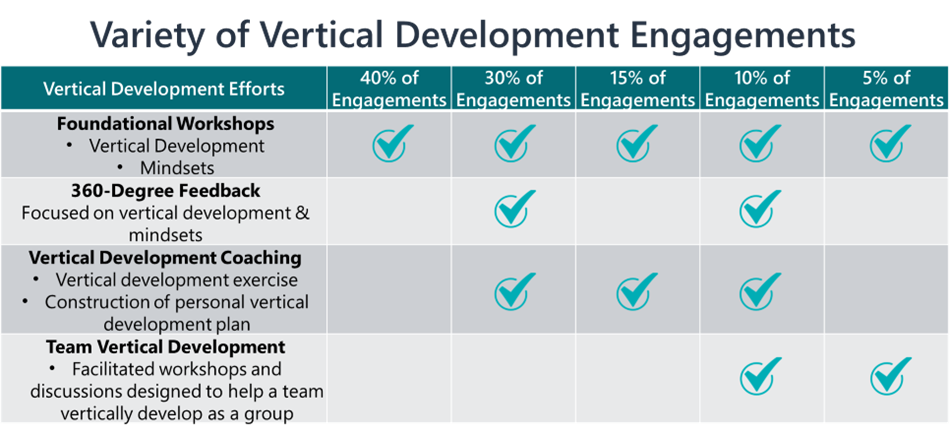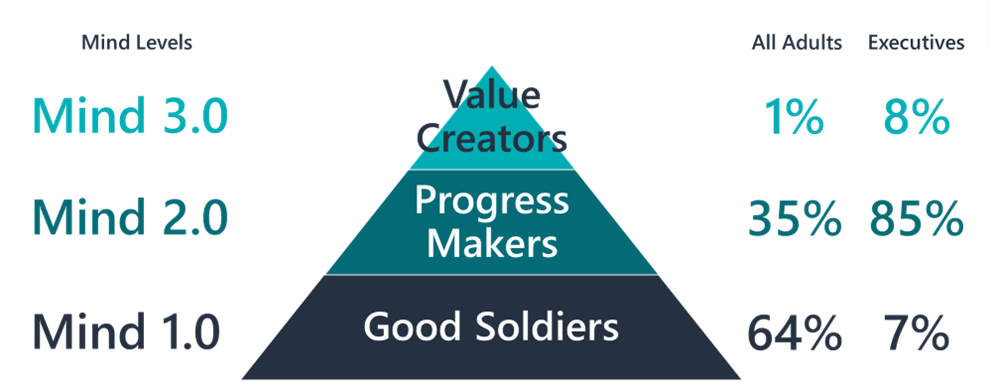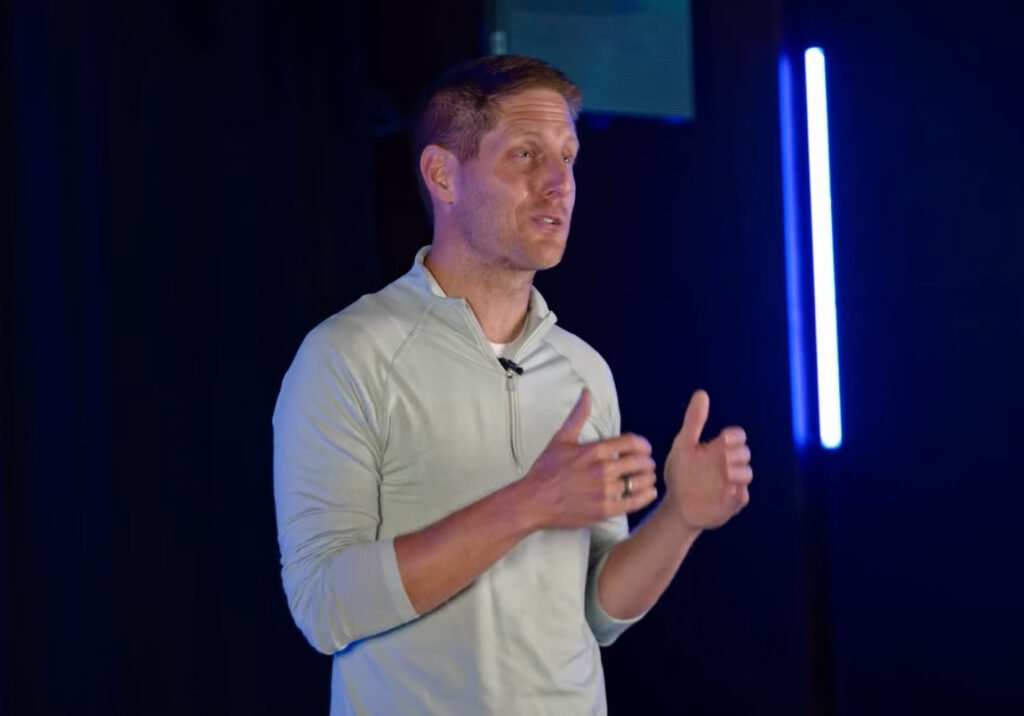A few weeks ago, I surveyed my newsletter subscribers and asked them what they would like to see me write about. A common theme from the responses was that they wanted to learn more about my business and the impact that it is having on the leaders and organizations that I work with.
So, over a series of a few weeks, I am sharing:
- Last week: The Evolution of My Consulting Business
- This week: The Impact of Vertical Development on Individual Leaders
- Next week: The Impact of Vertical Development on Organizations
Common Vertical Development Efforts that I Engage In
When I work with organizations on vertical development, I generally have two different types of audiences:
- Groups of leaders (generally mid-level managers and above)
- Leadership teams (generally executive teams)
When I work with “groups of leaders,” generally, I am just doing foundational workshops for them on vertical development and mindsets. Sometimes those are one-off workshops. Other times, they are a workshop series.
When I work with “leadership teams,” I am doing some foundational workshops, but I am also doing something more, which can include:
- 360-degree feedback
- Vertical development coaching
- Team vertical development efforts
Here is a rough breakdown of how this looks in my consulting practice.

As you can imagine, I see the largest impacts with the leaders (1) that I work with for the longest, and (2) engage in more vertical development efforts.
High-level Overview of the Impact of Vertical Development on Individual Leaders
When I start working with leaders, I find that the majority of them operate at the Mind 2.0 level.

While there can be quite the variety within this level (e.g., low Mind 2.0 narcissists vs high Mind 2.0 who are pretty effective leaders), they generally share these characteristics:
- They operate as doers as opposed to facilitators
- They are short-term focused as opposed to long-term focused
- They prioritize fruits (i.e., outcomes, results) instead of foundations (e.g., culture, purpose, strategy)
- They possess a narrow window of tolerance for failure and problems as opposed to the mindsets necessary for creativity, innovation, and agility
- They protect themselves as opposed to being transparent and vulnerable
For 90%+ of leaders and executives that I get to know, I am able to see significant shifts and improvements across these characteristics (e.g., they become less of a “doer” and more of a “facilitator”). But, there are some who resist engaging in vertical development efforts (unfortunately, these are most commonly the CEOs).
The amount of growth and development that I see, I believe is based on at least two factors:
- How much effort they put in
- Where they start (leaders who are lower in their vertical altitude demonstrate greater resistance and their progress feels slower than those who start the process from a higher vertical altitude)
Specific Examples of the Impact of Vertical Development on Individual Leaders
There are dozens of examples that I could dive into to share the impact of vertical development on the leaders I have worked with. But, for now, let me share three.
Tori – Executive Director of Operations
Before I met Tori, I was warned by her peers that she was a bristly person. I was told, “she doesn’t like people.”
When I met Tori, that warning was correct. Tori, while exceptional at fulfilling the duties of her job, did not have much patience for others. In my first coaching call with her, she told me, “I don’t have time for others’ emotions. They either get the job done or they don’t.”
In a relatively short period of time of working with her, she began to soften up, and she even asked me to collect feedback from her subordinates about how she is doing as a leader.
As a result of her vertical development shifts, which include developing a significantly higher emotional intelligence, the turnover in her division has dramatically decreased.
In a recent coaching call, she asked me, “Do you have any book recommendations for how I can like people more?”
Is she where she wants to be? Not yet, but she sure has come a long way.
Martin – Head of Sales
When I first met Martin, it was clear that his chief mentality was: “Its my way or the highway.” Not only did this apply with how he led his people, but it also applied to the coaching I was doing. At first, he was very resistant to engage in the vertical development exercises I was trying to do with him.
It was clear to me that his body’s nervous system was really high-strung and anything that pulled him out of his comfort zone or expertise made a big warning siren go off in his body.
The more I got to know him, the more comfortable he felt with me, and the more he opened up. From a place of vulnerability, he admitted that he commonly shut down the ideas of his subordinates. When I asked why, he stated, “I believe that if others like my subordinates’ ideas, they will think I am irrelevant and replaceable.”
After several months of working with him, and with some encouragement, I was pleasantly surprised that he had started meditating and doing yoga (this was to help him release the tension in his body’s nervous system).
Also, I gave him challenges to take in the ideas of his subordinates. At first, this was very difficult for him. But, after a few months, he made a breakthrough. He told me, “I used to think that if we ran with my employees’ ideas, instead of my own, I would be less valued within my organization. I am now realizing that when I run with my employees’ ideas, I am actually more valued within my organization. We have made more progress and improvement in the last few months than the last few years.”
Has he reached his potential? No.
Does he still shut down the ideas of his employees and struggle with his aggressiveness at times? Yes.
But, where he is now feels like a night-and-day difference from where he was.
Sharon – CFO
When I first met Sharon, I could feel her energy and focus. She was a driven and passionate person. It made me wonder what her energy and passion was directed toward. So, I asked her, “How do you measure success in your business.”
Here answer was, “Double-digit growth year-over-year.”
To me, this quickly revealed that she was operating in Mind 2.0 – Progress Maker Mode, focused on results.
After working with her, helping her to understand the different vertical development levels and the value of Mind 3.0 – Value Creator Mode, she approached me and said the following: “I messed up yesterday. I had a company-wide all-hands meeting and all I talked about was about our financial goals and metrics. I didn’t say one word about our purpose or the meaning behind those numbers.”
Shortly thereafter, she was promoted to be a CEO of a sister company and one of her first courses of actions was to bring me in to help her team:
- Learn about vertical development and elevated leadership
- Understand the importance and value of focusing on purpose more than outcomes and metrics
Summary
I consider myself so honored to play a role in the transformation and elevation of leaders.
The best part of my job is when I hear a leader tell me: “Vertical development has changed my life.”
When I hear statements like this, I normally ask, “how so?” And, it is interesting that the majority of the time they don’t talk about their work, they talk about their family.
That is the power of vertical development. It doesn’t just impact our lives inside work. When we vertically develop, we improve in all facets of our life.
If you want to explore employing vertical development in your organization, let’s connect.










